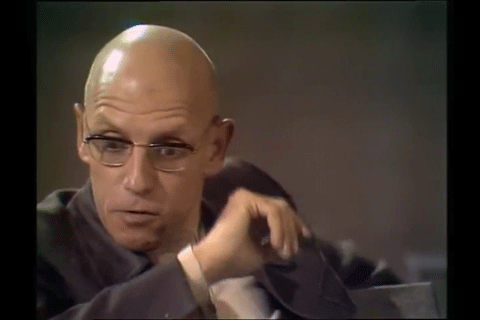 QUELL SUPRISE! French philosopher Michel Foucault in a moment of incredulity. |
Sunday at SPACE Gallery, the USM Philosophy Symposium will host a film screening of a legendary debate between Noam Chomsky and Michel Foucault. Held in the Netherlands in 1971, the discussion is seen as a touchstone in philosophy circles, spanning human nature, creativity, politics, and more.
The debate’s more or less a two-parter, focusing first on how Chomsky, the linguistics professor and left-wing activist, and Foucault, the post-Structuralist social critic, each conceive of human knowledge. Chomsky uses innate, fundamental terms like “development,” “creativity,” and “genius”; Foucault’s take is slightly more complex, employing terms of constantly shifting networks of scientific study, social dynamics, class formations, and power relations. It all makes sense once the conversation expands to politics in the second half, and I asked USM Philosophy Professor Jason Read, who will lead a post-film discussion, about how the debate’s themes could be applied today.
This “debate” took place 43 years ago. How do you think the surge of technology — the internet and its decentralizing of knowledge — has changed the conversation?
One of the most salient points that I feel Foucault makes in his discussion is “that the real political task in a society such as ours is to criticize the workings of institutions, which appear to be both neutral and independent.” I take his general point that one must always be suspicious when confronted with an institution that appears to liberate us, or that appears to be completely independent of power. I would apply this kind of suspicion to the internet. On first glance the internet appears to present a world where anyone can say everything, which is exactly the opposite of an older world where the channels of production and dissemination were strictly controlled. One could raise two Foucauldian responses to this: first, in what way has the imperative to communicate become a norm of power? I am thinking of the way that our constant communications feed both into centers of profit and into state institutions. Second, are things really so decentralized as we like to think? What are “trending topics” but an explicit reminder of how much our attention and focus is still controlled by the mass media corporations that we seem to have escaped?
Chomsky states that creativity is a fundamental element of human life, and that a decent society should resist the influence of coercive institutions who attempt to control it. How does this square with the political libertarianism we’re seeing today?
I actually think that Chomsky’s ideal of creativity is a pretty good standard. However, I would add to it the more or less Foucauldian caveat (following the remarks above) that it is at the point where an institution promises to realize our creativity that we should be suspicious. I think that it is important to remember that this discussion took place in 1971, when “creativity” seemed like a pretty good word to unify the various struggles — of workers against the corporation, students against the university, people against gender norms. I wonder if one of the effects of those years of struggle is that “creativity” itself has become co-opted. What corporation, what commodity, what job, does not claim to be creative? My point is not that creativity is a totally bankrupt word, but just that we have to be suspicious of the way in which the struggle to be creative has changed society but not exactly in the way that those that were waging it meant. I think that we need to be careful to guard against pseudo-creativity, the constant imperative to express ourselves, and think about the places where creativity is not encouraged. I am thinking of the ways in which the world is constantly being reinvented in terms of technology, but the social and economic structures of our society are sacrosanct.